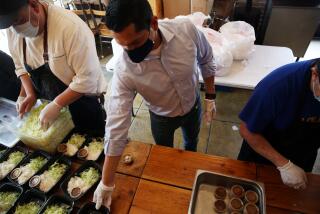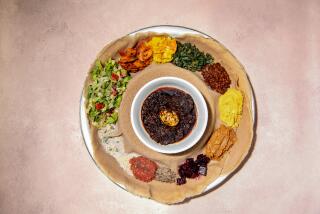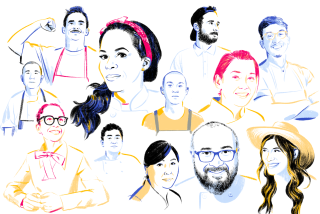Food nurtures a community
There’s a sign-in sheet at the door, with a note asking everyone to “Please limit yourself to one plate.” But nobody seems to be keeping track.
Joslyn Wyatt went through the dinner line twice, loading up on tri-tip and rice as if she didn’t know when she would eat again. She has been homeless, off and on, for eight years; a free hot meal is never a given.
Helen Shen made more than one trip to the buffet too, but not because the meal was free. “This is very good food,” Shen said, settling in between a scruffy, scar-faced stranger and her 92-year-old mother, who doesn’t speak English but has learned to recognize good macaroni and cheese.
Across from them, William Fishburn was too full to move. The 24-year-old and his girlfriend, Kathleen Westra, 23, have been crashing at the home of friends. “I haven’t eaten like this since I can remember,” Fishburn said. “My stomach doesn’t know what to do.” Westra nodded, plowing through her third bowl of ice cream.
Locals consider this dinner venue — the Jackie Robinson Center in Pasadena — the soul of a shifting community. Northwest Pasadena is best understood “if you think of South-Central in Los Angeles,” said Jarvis Emerson, director of the center, which offers everything from tutoring to drug treatment to aerobics for seniors, as well as the Wednesday night dinners.
The meals are provided by the Pasadena Food Bank, a small group of local do-gooders. Dinner began in December with 40 guests; last week almost 200 showed up. I’ve visited twice and was struck both times by the eclectic crowd: families straight from work and day care, elderly women in jewelry and leisure wear, homeless men with vacant stares.
“If you walk through the door,” said food bank board member Walter Jackson, “we feed you.”
*
Jackson has seen the empty cupboards behind Pasadena’s broad front porches. He spent years visiting strangers’ homes as a locksmith and, later, as a volunteer delivering meals to the homebound. “You see grandma with no money; her son stole it for drugs. A family with a kitchen in shambles; the kids sleeping on a mattress on the living room floor.”
Twenty years ago, Jackson set up an impromptu cold weather shelter in a vacant building. Dozens of hungry people showed up. “We went door-to-door in Pasadena, asking restaurants to help feed them,” he said. “And everyone — until we got to Robin — said ‘no.’”
Robin is Robin Salzer, owner of Robin’s Wood Fire B-B-Q and Grill, a Pasadena institution for almost 30 years. “When we knocked on his door, he opened his arms,” said Jackson. “Told me: ‘What do you want? Spare ribs? Baked beans? Here’s some money to get whatever else you need.’”
Jackson delivers the story with lingering disbelief. “Here’s this white man that I don’t even know. And he said ‘As long as I’ve got food, you’ve got food.’ Night after night, he kept us going.”
Winter passed and the shelter closed. The two men lost touch but reconnected four years ago when Salzer ran for Pasadena’s City Council. He lost the election but found a friend. “And I realized that I didn’t have to be in a swivel chair to help,” Salzer said.
They’re an odd couple at first glance, this slow-moving, yarn-spinning son of the South and the peripatetic businessman from Minnesota. But after an evening in their company, I see parallels that cinch their bond.
Jackson came to Los Angeles from Grady, Ala., with a ninth-grade education and the work ethic of a farmer. He left a truck repair job that paid $1.25 an hour and landed a gig here washing Greyhound buses for $3.75 an hour. “I figured I’d work a few weeks, make some money and go back home,” he said. Instead, his new boss offered to move his family here from Alabama.
He bought a house — $3,700 for five bedrooms on Marengo Avenue — and launched a key-making company that thrived for 39 years. Retirement left him comfortable but bored. Volunteer work now fills that void.
Salzer grew up in a working-class section of Milwaukee. He took a dishwashing job at IHOP the day he turned 16 and purchased the restaurant seven years later. A visit to his sister in California convinced him to cash out and head west. He staked his future on a shuttered coffee shop and turned it into a barbecue spot lauded by such foodies as Rachel Ray.
He remembers when Jackson showed up at his door. “We had just come through a hard time,” he said. “I’d almost lost the restaurant. There were weeks I didn’t have enough to make payroll. But my employees trusted me. We pulled through.
“Walt gave me a chance to give back,” Salzer said. “He couldn’t have known it on that night, but I knew a little about struggling.”
Now he knows enough about success to provide free meals for hundreds every Wednesday.
*
Northwest Pasadena knows a lot about struggling. In Jackson’s 57 years living there, he’s seen his community battered by crime, drugs and social dysfunction. “People got scattered, got scared,” he said. “You had the feeling that no one cared.”
But that was never true. “I’ve seen Pasadena at the high and the low,” said Joslyn Wyatt, 49 and living on the streets now. “But the people you grow up with don’t judge you.” Her eighth-grade teacher stops by sometimes to give her lunch money, she said.
The weekly community center meals have come to resemble a family reunion. The center scrapped plans to show movies during dinner. “It turns out people just want to talk,” Emerson said. Almost every one I spoke with at dinner offered a story of renewed connection.
“I always find somebody here that I knew,” said 74-year-old Sylvia Kernell, a retiree who was born in nearby Huntington Hospital. She gestured across the room at a woman leaning on a cane. “We used to go to parties together.”
Support has grown beyond the food bank to the neighborhood. Local high school students help serve each week, alongside parishioners from Abounding Grace, whose pastor helped launch the feeding program. Last month they were joined by uniformed Pasadena traffic cops, wearing hair nets instead of helmets and aprons over their uniforms.
And now the dinner menu includes spaghetti from the Restaurant Depot, and beans, rice and nachos from El Portal. “Nothing builds a community like food,” said Salzer. “The more people find out about it, the more they want to help.”
He pulled back the foil on a tub of barbecued beef, and I wanted to sign in myself and eat. And that, I admit, had more to do with the food than a hankering for community.
More to Read
Start your day right
Sign up for Essential California for news, features and recommendations from the L.A. Times and beyond in your inbox six days a week.
You may occasionally receive promotional content from the Los Angeles Times.






